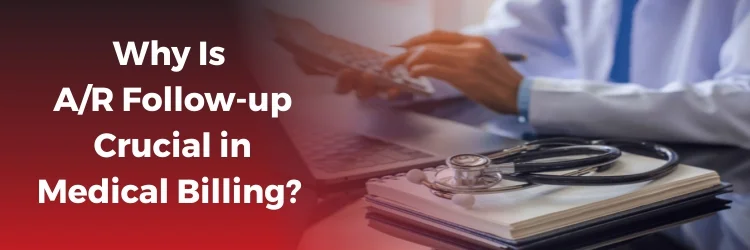Why Is A/R Follow-up Crucial in Medical Billing? Accounts Receivable (A/R) fuels the lifeblood of our Healthcare System. Medical Billing and A/R operations keep Hospital doors open and the revenue cycles turning. Doctors don't get paid without payment from patients and insurance companies, medical supply bills pile up, and even the electricity gets cut off. But it's not as simple as putting a statement in the mail. The Medical Billing Process, A/R, and A/R Follow-Up require specialized skills in the arcane art of Medical Coding. There is a uniform system for coding medicines and medical services, but Medical Coding is a constantly shifting playing field that sees the rules changed regularly. And so, there is the Medical Billing Specialist. This is a high-pressure job that requires constant training to stay current on the intricacies of the Medical Billing Process.
Three Stages of Medical Billing A/R Follow-Up.
The procedure for A/R follow-up is carried out in three stages.
- Identification
- Identify and analyze claims contained in the A/R "Aging Report." This is a report that lists all of the procedures billed and insurance coverage approved and denied. The goal is to determine if the denied coverage is due to miscoded reports to the insurance carrier.
- Analysis
- Then the claims are categorized as "uncollectable" or as claims where the insurance carrier has not paid the amount contracted for with the healthcare provider.
- Collection
- Claims deemed to still be inside the filing limit of the insurance carrier are refiled after all the requirements are fulfilled. This includes checking for typos or other errors in the basic information. Once this is done, bills are again generated and sent out.
While these stages are distinct, there are instances where the dividing line is blurred. What's important is to reach the final step that hopefully results in payment, in full or part, of the outstanding balance.
6 Reasons Why A/R Follow-up Is Important In Medical Billing Process
The importance of A/R follow-up is evident. But there is more than one benefit. The bills need to be paid for the reasons stated initially. In the bigger picture, bills not being paid for technical reasons can snowball and depress the overall confidence that the Healthcare sector enjoys today. And if the situation continues, the impact will spread to the future of the entire medical profession. A/R Follow-Up in Medical Billing provides:
1. Financial Stability
Any healthcare provider's financial stability depends on maintaining a positive cash flow. A steady flow of revenue to cover expenses is crucial to providing patient care services, and A/R follow-up is critical.
2. Recover Overdue Payments:
All hospitals, physicians, surgical centers, nursing homes, outpatient clinics, and any facility needs to recover overdue payments. When a team is continuously involved in claims follow-up, the odds of healthcare providers receiving payments on time increase.
3. Outstanding Accounts paid quickly:
The goal of effective A/R management is to decrease or eliminate the number of times accounts are outstanding. Tracking unpaid invoices, assessing what action is required to secure payment, and implementing procedures for timely payment. And doing all of this quickly is a vital component.
4. No Missing Claims:
The first reason for the delay in payments is the claim not being received. This happens when paper claims are lost. To avoid this, the claim should be delivered in electronic form. If the A/R team followed up and discovered that the claim hadn't been received, another payment request could be quickly initiated.
5. Denied Claims:
If the reason for the denial of the claim is procedural, a new claim request with the required corrections can be submitted. By being proactive and contacting insurance companies first to discover the denial reason, the A/R department can make sure all claims are followed through. This function alone makes the A/R Follow-up team worth its weight in silver.
6. Pending Claims Recovery:
If claims are kept pending due to additional information needed, the A/R team can notify the member, and then suitable action is taken so that the process can be completed quickly.
Why Is A/R Follow-Up Crucial in Medical Billing? It Keeps the System Functioning.
Throughout history, bill collecting has played a crucial role in commerce. This doesn't mean that all customers, or patients, are intent on ducking payment for goods or services received. Most people are willing to pay, but additional obstacles have been erected in our modern world. By any measurement, today's healthcare system uses a highly complex procedure for billing. Any misstep at any stage of the process can fail. The mistake needs to be isolated and corrected, but often this takes too much time, and other options for payment have been put into motion. This can create a scenario of the "dog chasing its tail." Hopefully, by examining the various steps in the billing process, payment can be received without delay.

Steve Smith
Apr 05, 2023 10:57:27 amI like how you mentioned that providing statements